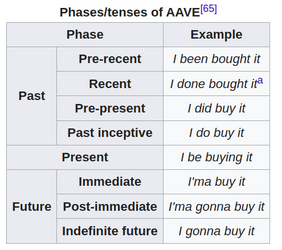Standardized Profile
kiwifarms.net
- Joined
- Oct 5, 2018
I believe the academic hypothesis is that slaves modified English to express the grammar of their native languages, which is why AAVE has so many strange constructions to express tense and aspect. This table from Wikipedia is informative:

I'm not a specialist, but for various reasons I don't think it's really a well-defined dialect with rules like this. It's also evident AAVE evolves very rapidly, introducing new words at a lightning rate. Could such a rapidly evolving dialect maintain these rather fine distinctions in meaning? Perhaps, maybe, I don't know.
I'm also not sure I buy the idea it's just hillbilly-speak either. In Huckleberry Finn, Twain uses several distinct dialects, which he identifies as "the Missouri negro dialect; the extremest form of the backwoods Southwestern dialect; the ordinary 'Pike County' dialect; and four modified varieties of this last." In a letter to William Dean Howells, Twain opined that "a negro sometimes (rarely) says 'goin' and sometimes says 'gwyne,' and they make such discrepancies in other words--and when you come to reproduce them on paper they look as if the variation resulted from the writer's carelessness." He also praised Joel Chandler Harris (author/compiler of Uncle Remus) and George Washington Cable's handling of the "negro and creole dialects." So the unique nature of the negro or African American dialect was acknowledged in the mid-to-late 19th century. It wasn't considered identical to backwoods/hillbilly speech at the time.

I'm not a specialist, but for various reasons I don't think it's really a well-defined dialect with rules like this. It's also evident AAVE evolves very rapidly, introducing new words at a lightning rate. Could such a rapidly evolving dialect maintain these rather fine distinctions in meaning? Perhaps, maybe, I don't know.
I'm also not sure I buy the idea it's just hillbilly-speak either. In Huckleberry Finn, Twain uses several distinct dialects, which he identifies as "the Missouri negro dialect; the extremest form of the backwoods Southwestern dialect; the ordinary 'Pike County' dialect; and four modified varieties of this last." In a letter to William Dean Howells, Twain opined that "a negro sometimes (rarely) says 'goin' and sometimes says 'gwyne,' and they make such discrepancies in other words--and when you come to reproduce them on paper they look as if the variation resulted from the writer's carelessness." He also praised Joel Chandler Harris (author/compiler of Uncle Remus) and George Washington Cable's handling of the "negro and creole dialects." So the unique nature of the negro or African American dialect was acknowledged in the mid-to-late 19th century. It wasn't considered identical to backwoods/hillbilly speech at the time.